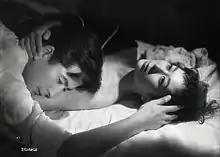The Eternal Breasts
The Eternal Breasts (乳房よ永遠なれ, Chibusa yo eien nare), also titled Forever a Woman, is a 1955 Japanese drama film directed by actress Kinuyo Tanaka. It is based on the life of tanka poet Fumiko Nakajō (1922–1954).[3]
| The Eternal Breasts | |
|---|---|
 Ryōji Hayama and Yumeji Tsukioka | |
| Japanese name | |
| Kanji | 乳房よ永遠なれ |
| Directed by | Kinuyo Tanaka |
| Written by |
|
| Produced by |
|
| Starring |
|
| Cinematography | Kumenobu Fujioka |
| Edited by | Kimihiko Nakamura |
| Music by | Takanobu Saitō |
Production company | |
| Distributed by | Nikkatsu |
Release date | |
Running time | 110 minutes[1][2] |
| Country | Japan |
| Language | Japanese |
Plot
Unhappily married Fumiko, mother of two children, divorces her drug-addicted husband after an incident which she regards as an act of unfaithfulness, and moves back to her mother. At the same time, she tries to find her voice as a poet, regularly attending a poetry circle, encouraged by her married tutor Hori, whom she loves with a respectful distance. While struggling with the divorce and the fact that she could only take her daughter with her, she is diagnosed with late-stage breast cancer. She undergoes a double mastectomy, which she writes about in a series of widely noticed and prize-winning poems, and tries to live her life as freely as possible and as her illness allows. She has a short affair with journalist Ōtsuki, who writes about her in a newspaper series before she finally dies.
Cast
- Yumeji Tsukioka as Fumiko Shimojō, née Nakajō
- Ryōji Hayama as Akira Ōtsuki
- Junkichi Orimoto as Shigeru Anzai
- Hiroko Kawasaki as Tatsuko
- Shirō Ōsaka as Yoshio
- Ikuko Kimuro as Seiko
- Masayuki Mori as Takashi Hori
- Yōko Sugi as Kinuko, Hori's wife
- Chōko Iida as Hide
- Bokuzen Hidari as Hide's husband
- Tōru Abe as Yamagami
- Fumie Kitahara as Kobayashi
- Kinuyo Tanaka as neighbour's wife
- Yoshiko Tsubouchi as Shirakawa
Reception
Unanimously highly regarded for its directorial skills, film scholars differ in their evaluation of the themes addressed in The Eternal Breasts. While Alejandra Armendáriz-Hernández calls it "a daring depiction of female sexuality […] as well as a powerful instance of women's creativity and self-expression",[4] Alexander Jacoby sees the "feminist and progressive" theme of a woman willingly choosing career over marriage obscured by the film's concentration on her illness, thus shying away from the more controversial implications.[5]
Legacy
The Eternal Breasts has seen repeated screenings at festivals and film museums in the US,[6] in France[7] and in Germany.[8] The British Film Institute included the film in its 2020 The best Japanese film of every year – from 1925 to now list.[4]
References
- "乳房よ永遠なれ (The Eternal Breasts)". Japanese Movie Database (in Japanese). Retrieved 11 January 2021.
- "乳房よ永遠なれ (The Eternal Breasts)". Kinenote (in Japanese). Retrieved 10 June 2023.
- Sato, Hiroaki (2015). Japanese Women Poets: An Anthology. Milton Park and New York: Routledge. ISBN 978-0-7656-1783-5.
- "The best Japanese film of every year – from 1925 to now at the British Film Institute website". British Film Institute. Retrieved 2 January 2022.
- Jacoby, Alexander (2008). Critical Handbook of Japanese Film Directors: From the Silent Era to the Present Day. Berkeley: Stone Bridge Press. ISBN 978-1-933330-53-2.
- "To Save and Project: The 18th MoMA International Festival of Film Preservation" (PDF). Museum of Modern Art. 2022. Retrieved 9 June 2023.
- "Maternité éternelle". Festival Lumière (in French). 2021. Archived from the original on 16 October 2021. Retrieved 9 June 2023.
- "Eternal Breasts". Nippon Connection. 2022. Retrieved 9 June 2023.
External links
- The Eternal Breasts at IMDb
- Scanlon, Hayley (6 December 2017). "The Eternal Breasts". Windows on Worlds. Retrieved 11 January 2021.